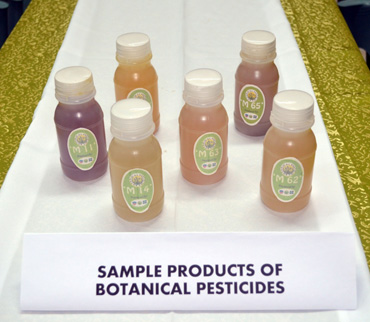 Researchers from the Central Luzon State University (CLSU) have found six plants possessing biopesticide properties, which can be an alternative to commercial pesticides. The findings were presented during the review of the Central Luzon biodiversity program, Integrated Research and Development Program on Biodiversity Assessment of Selected Forest Ecosystems in Central Luzon.
Researchers from the Central Luzon State University (CLSU) have found six plants possessing biopesticide properties, which can be an alternative to commercial pesticides. The findings were presented during the review of the Central Luzon biodiversity program, Integrated Research and Development Program on Biodiversity Assessment of Selected Forest Ecosystems in Central Luzon.Biopesticide is a substance derived from plants capable of protecting selected crops against certain diseases and pests.
The team of researchers, led by its program leader, Dr. Paz-Alberto of the Institute of Climate Change and Environmental Management (ICCEM) presented the results and accomplishments of the two component projects of the said study; namely, Project 2: Molecular Identification and Green Technology Development of High Valued Plants in Central Luzon, and Project 5: IEC and Technology Transfer of Biodiversity Conservation and Utilization.
During the review, informational materials on biopesticides and its preparation was showcased, which also included information on the flora and fauna species present as well as indigenous knowledge of the tribes found in the project areas in Aurora, Nueva Ecija, and Bataan.
Plant samples were collected from the forests in identified sites. These samples were screened to determine whether they have potential as biopesticide and later on processed into liquid biopesticides.
Dr. Ronilo Alberto, the focal person of Project 2, explained that the biopesticides extracted can be applied to crops as a preventive or curative measure. However, the preventive approach is more effective based on their microplot trials on selected crops like tomato, pepper, bitter gourd and onion.
FERD Director Dr. Feliciano G. Calora Jr. pointed out that although the identified plants exhibit the ability to prevent crops from contacting diseases in laboratory setup, there is no conclusive evidence yet that biopesticides can be applied effectively in large scale, such as in commercial vegetable farms.
Dr. Calora said that more field trials and further research can be done to test the efficacy of biopesticides particularly on pest and diseases. Processes that can stabilize and lengthen the shelf life of biopesticides should also be looked into.
PCAARRD will continue to support CLSU in the developed technology especially with its potential as a safer alternative to harmful pesticides found in the market.
